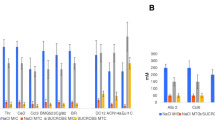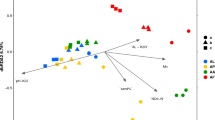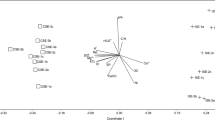Abstract
Mangroves are a challenging ecosystem for the microorganisms that inhabit them, considering they are subjected to stressful conditions such as high and fluctuating salinity. Metagenomic analysis of mangrove soils under contrasting salinity conditions was performed at the mouth of the Ranchera River to the Caribbean Sea in La Guajira, Colombia, using shotgun sequencing and the Illumina Hiseq 2500 platform. Functional gene analysis demonstrated that salinity could influence the abundance of microbial genes involved in osmoprotectant transport, DNA repair, heat shock proteins (HSP), and Quorum Sensing, among others. In total, 135 genes were discovered to be linked to 12 pathways. Thirty-four genes out of 10 pathways had statistical differences for a p-value and FDR < 0.05. UvrA and uvrB (nucleotide excision repair), groEL (HSP), and secA (bacterial secretion system) genes were the most abundant and were enriched by high salinity. The results of this study showed the prevalence of diverse genetic mechanisms that bacteria use as a response to survive in the challenging mangrove, as well as the presence of various genes that are recruited in order to maintain bacterial homeostasis under conditions of high salinity.



Similar content being viewed by others
References
Almeida A, Nayfach S, Boland M, Strozzi F, Beracochea M, Shi ZJ, Pollard KS, Sakharova E, Parks DH, Hugenholtz P, Segata N, Kyrpides NC, Finn RD (2021) A unified catalog of 204,938 reference genomes from the human gut microbiome. Nat Biotechnol 39(1):105–114. https://doi.org/10.1038/s41587-020-0603-3
Alongi DM (2008) Mangrove forests: resilience, protection from tsunamis, and responses to global climate change. Estuar Coast Shelf Sci 76(1):1–13. https://doi.org/10.1016/j.ecss.2007.08.024
Ambily Nath IV, Loka Bharathi PA (2011) Diversity in transcripts and translational pattern of stress proteins in marine extremophiles. Extremophiles : Life under Extreme Conditions 15(2):129–153. https://doi.org/10.1007/s00792-010-0348-x
Andreote FD, Jiménez DJ, Chaves D, Dias AC, Luvizotto DM, Dini-Andreote F, Fasanella CC, Lopez MV, Baena S, Taketani RG, de Melo IS (2012) The microbiome of Brazilian mangrove sediments as revealed by metagenomics. PLoS ONE 7(6):e38600. https://doi.org/10.1371/journal.pone.0038600
Arsène F, Tomoyasu T, Bukau B (2000) The heat shock response of Escherichia coli. Int J Food Microbiol 55(1–3):3–9. https://doi.org/10.1016/s0168-1605(00)00206-3
Ban C, Yang W (1998) Crystal structure and ATPase activity of MutL: implications for DNA repair and mutagenesis. Cell 95(4):541–552. https://doi.org/10.1016/s0092-8674(00)81621-9
Banerjee A, Sarkar S, Cuadros-Orellana S, Bandopadhyay R (2019) Exopolysaccharides and biofilms in mitigating salinity stress: The biotechnological potential of halophilic and soil-inhabiting PGPR microorganisms. In: Microorganisms in saline environments: strategies and functions (pp. 133–153). Springer, Cham. https://doi.org/10.1007/978-3-030-18975-4_6
Bell AW, Buckel SD, Groarke JM, Hope JN, Kingsley DH, Hermodson MA (1986) The nucleotide sequences of the rbsD, rbsA, and rbsC genes of Escherichia coli K12. J Biol Chem 261(17):7652–7658. https://doi.org/10.1016/S0021-9258(19)57448-8
Bittner LM, Arends J, Narberhaus F (2017) When, how and why? Regulated proteolysis by the essential FtsH protease in Escherichia coli. Biol Chem 398(5–6):625–635. https://doi.org/10.1515/hsz-2016-0302
Bove P, Capozzi V, Garofalo C, Rieu A, Spano G, Fiocco D (2012) Inactivation of the ftsH gene of Lactobacillus plantarum WCFS1: effects on growth, stress tolerance, cell surface properties and biofilm formation. Microbiol Res 167(4):187–193. https://doi.org/10.1016/j.micres.2011.07.001
Buchfink B, Xie C, Huson DH (2015) Fast and sensitive protein alignment using DIAMOND. Nat Methods 12(1):59–60. https://doi.org/10.1038/nmeth.3176
Cappa F, Cattivelli D, Cocconcelli PS (2005) The uvrA gene is involved in oxidative and acid stress responses in Lactobacillus helveticus CNBL1156. Res Microbiol 156(10):1039–1047. https://doi.org/10.1016/j.resmic.2005.06.003
Chen C, Chen H, Zhang Y, Thomas HR, Frank MH, He Y, Xia R (2020) TBtools: an integrative toolkit developed for interactive analyses of big biological data. Mol Plant 13(8):1194–1202
Chi YH, Koo SS, Oh HT, Lee ES, Park JH, Phan KAT, Wi SD, Bae SB, Paeng SK, Chae HB, Kang CH, Kim MG, Kim WY, Yun DJ, Lee SY (2019) The physiological functions of universal stress proteins and their molecular mechanism to protect plants from environmental stresses. Front Plant Sci 10:750. https://doi.org/10.3389/fpls.2019.00750
Chong J, Liu P, Zhou G, Xia J (2020) Using MicrobiomeAnalyst for comprehensive statistical, functional, and meta-analysis of microbiome data. Nat Protoc 15(3):799–821. https://doi.org/10.1038/s41596-019-0264-1
Coker JA, DasSarma P, Kumar J, Müller JA, DasSarma S (2007) Transcriptional profiling of the model Archaeon Halobacterium sp. NRC-1: responses to changes in salinity and temperature. Saline Syst. https://doi.org/10.1186/1746-1448-3-6
Dervyn E, Suski C, Daniel R, Bruand C, Chapuis J, Errington J, Jannière L, Ehrlich SD (2001) Two essential DNA polymerases at the bacterial replication fork. Science (new York, NY) 294(5547):1716–1719. https://doi.org/10.1126/science.1066351
Deuerling E, Mogk A, Richter C, Purucker M, Schumann W (1997) The ftsH gene of Bacillus subtilis is involved in major cellular processes such as sporulation, stress adaptation and secretion. Mol Microbiol 23(5):921–933. https://doi.org/10.1046/j.1365-2958.1997.2721636.x
Dubrez L, Causse S, Borges Bonan N, Dumétier B, Garrido C (2020) Heat-shock proteins: chaperoning DNA repair. Oncogene 39(3):516–529. https://doi.org/10.1038/s41388-019-1016-y
Ellis RJ (2020) Stress proteins as molecular chaperones. In: Stress proteins in medicine (pp. 1–26). CRC Press
Ferreira MJ, Mendes AL, de Sá-Nogueira I (2017) The MsmX ATPase plays a crucial role in pectin mobilization by Bacillus subtilis. PLoS ONE 12(12):e0189483. https://doi.org/10.1371/journal.pone.0189483
Fischer B, Rummel G, Aldridge P, Jenal U (2002) The FtsH protease is involved in development, stress response and heat shock control in Caulobacter crescentus. Mol Microbiol 44(2):461–478. https://doi.org/10.1046/j.1365-2958.2002.02887.x
Garcie C, Tronnet S, Garénaux A, McCarthy AJ, Brachmann AO, Pénary M, Houle S, Nougayrède JP, Piel J, Taylor PW, Dozois CM, Genevaux P, Oswald E, Martin P (2016) The bacterial stress-responsive Hsp90 Chaperone (HtpG) is required for the production of the genotoxin colibactin and the siderophore Yersiniabactin in Escherichia coli. J Infect Dis 214(6):916–924. https://doi.org/10.1093/infdis/jiw294
Goo E, Majerczyk CD, An JH, Chandler JR, Seo YS, Ham H, Lim JY, Kim H, Lee B, Jang MS, Greenberg EP, Hwang I (2012) Bacterial quorum sensing, cooperativity, and anticipation of stationary-phase stress. Proc Natl Acad Sci USA 109(48):19775–19780. https://doi.org/10.1073/pnas.1218092109
Goyal K, Qamra R, Mande SC (2006) Multiple gene duplication and rapid evolution in the groEL gene: functional implications. J Mol Evol 63(6):781–787. https://doi.org/10.1007/s00239-006-0037-7
Gregory GJ, Boyd EF (2021) Stressed out: Bacterial response to high salinity using compatible solute biosynthesis and uptake systems, lessons from Vibrionaceae. Comput Struct Biotechnol J 19:1014–1027. https://doi.org/10.1016/j.csbj.2021.01.030
Griffiths BS, Philippot L (2013) Insights into the resistance and resilience of the soil microbial community. FEMS Microbiol Rev 37(2):112–129. https://doi.org/10.1111/j.1574-6976.2012.00343.x
Guo L, Huang L, Su Y, Qin Y, Zhao L, Yan Q (2018) secA, secD, secF, yajC, and yidC contribute to the adhesion regulation of Vibrio alginolyticus. MicrobiologyOpen 7(2):e00551. https://doi.org/10.1002/mbo3.551
Imchen M, Kumavath R, Barh D, Azevedo V, Ghosh P, Viana M, Wattam AR (2017) Searching for signatures across microbial communities: metagenomic analysis of soil samples from mangrove and other ecosystems. Sci Rep 7(1):8859. https://doi.org/10.1038/s41598-017-09254-6
Kashyap PL, Rai A, Singh R, Chakdar H, Kumar S, Srivastava AK (2016) Deciphering the salinity adaptation mechanism in Penicilliopsis clavariiformis AP, a rare salt tolerant fungus from mangrove. J Basic Microbiol 56(7):779–791. https://doi.org/10.1002/jobm.201500552
Kloska A, Cech GM, Nowicki D, Maciąg-Dorszyńska M, Bogucka AE, Markert S, Becher D, Potrykus K, Czaplewska P, Szalewska-Pałasz A (2022) Three microbial Musketeers of the Seas: Shewanella baltica, Aliivibrio fischeri and Vibrio harveyi, and their adaptation to different salinity probed by a proteomic approach. Int J Mol Sci 23(2):619. https://doi.org/10.3390/ijms23020619
Koo H, Hakim JA, Morrow CD, Crowley MR, Andersen DT, Bej AK (2018) Metagenomic analysis of microbial community compositions and cold-responsive stress genes in selected Antarctic lacustrine and soil ecosystems. Life (basel, Switzerland) 8(3):29. https://doi.org/10.3390/life8030029
Kumari P, Mahapatro GK, Banerjee N, Sarin NB (2015) Ectopic expression of GroEL from Xenorhabdus nematophila in tomato enhances resistance against Helicoverpa armigera and salt and thermal stress. Transgenic Res 24(5):859–873. https://doi.org/10.1007/s11248-015-9881-9
Kusters I, Driessen AJ (2011) SecA, a remarkable nanomachine. Cellular and Molecular Life Sci: CMLS 68(12):2053–2066. https://doi.org/10.1007/s00018-011-0681-y
Laport MS, Lemos JA, Bastos Md, doCBurneGiambiagi-De Marval MRAM (2004) Transcriptional analysis of the groE and dnaK heat-shock operons of Enterococcus faecalis. Res Microbiol 155(4):252–258. https://doi.org/10.1016/j.resmic.2004.02.002
Le PT, Makhalanyane TP, Guerrero LD, Vikram S, Van de Peer Y, Cowan DA (2016) Comparative metagenomic analysis reveals mechanisms for stress response in hypoliths from extreme hyperarid deserts. Genome Biol Evol 8(9):2737–2747. https://doi.org/10.1093/gbe/evw189
Lewis S, Handy RD, Cordi B, Billinghurst Z, Depledge MH (1999) Stress proteins (HSP’s): methods of detection and their use as an environmental biomarker. Ecotoxicology 8(5):351–368. https://doi.org/10.1023/A:1008982421299
Li Y, Chen Z, Matthews LA, Simmons LA, Biteen JS (2019) Dynamic exchange of two essential DNA polymerases during replication and after Fork Arrest. Biophys J 116(4):684–693. https://doi.org/10.1016/j.bpj.2019.01.008
Lim B, Miyazaki R, Neher S, Siegele DA, Ito K, Walter P, Akiyama Y, Yura T, Gross CA (2013) Heat shock transcription factor σ32 co-opts the signal recognition particle to regulate protein homeostasis in E. coli. PLoS Biol 11(12):1001735. https://doi.org/10.1371/journal.pbio.1001735
Maeda S, Omata T (1997) Substrate-binding lipoprotein of the cyanobacterium Synechococcus sp. strain PCC 7942 involved in the transport of nitrate and nitrite. J Biol Chem 272:3036–3041. https://doi.org/10.1074/jbc.272.5.3036
Matarredona L, Camacho M, Zafrilla B, Bonete MJ, Esclapez J (2020) The role of stress proteins in haloarchaea and their adaptive response to environmental shifts. Biomolecules 10(10):1390. https://doi.org/10.3390/biom10101390
Mori AS, Furukawa T, Sasaki T (2013) Response diversity determines the resilience of ecosystems to environmental change. Biol Rev Camb Philos Soc 88(2):349–364. https://doi.org/10.1111/brv.12004
Munns R, Tester M (2008) Mechanisms of salinity tolerance. Annu Rev Plant Biol 59:651–681. https://doi.org/10.1146/annurev.arplant.59.032607.092911
Muñoz-García A, Mestanza O, Isaza JP, Figueroa-Galvis I, Vanegas J (2019) Influence of salinity on the degradation of xenobiotic compounds in rhizospheric mangrove soil. Environ Pollut (barking, Essex: 1987) 249:750–757. https://doi.org/10.1016/j.envpol.2019.03.056
Muñoz-García A, Arbeli Z, Boyacá-Vásquez V, Vanegas J (2022) Metagenomic and genomic characterization of heavy metal tolerance and resistance genes in the rhizosphere microbiome of Avicennia germinans in a semi-arid mangrove forest in the tropics. Marine Pollut Bull 184:114204. https://doi.org/10.1016/j.marpolbul.2022.114204
Nathan VK, Vijayan J, Ammini P (2020) Comparison of bacterial diversity from two mangrove ecosystems from India through metagenomic sequencing. Reg Stud Marine Sci 35:101184. https://doi.org/10.1016/j.rsma.2020.101184
Obmolova G, Ban C, Hsieh P, Yang W (2000) Crystal structures of mismatch repair protein MutS and its complex with a substrate DNA. Nature 407(6805):703–710. https://doi.org/10.1038/35037509
Park SH, Lee HW, Cao W (2010) Screening of nitrosative stress resistance genes in Coxiella burnetii: Involvement of nucleotide excision repair. Microb Pathog 49(6):323–329. https://doi.org/10.1016/j.micpath.2010.08.001
Pasolli E, Asnicar F, Manara S, Zolfo M, Karcher N, Armanini F, Beghini F, Manghi P, Tett A, Ghensi P, Collado MC, Rice BL, DuLong C, Morgan XC, Golden CD, Quince C, Huttenhower C, Segata N (2019) Extensive unexplored human microbiome diversity revealed by over 150,000 genomes from metagenomes spanning age, geography, and lifestyle. Cell 176(3):649-662.e20. https://doi.org/10.1016/j.cell.2019.01.001
Polanía J, Orozco-Toro CA, Ángel IF (2006) Delta del Río Ranchería (La Guajira, Colombia): caudal, salinidad y transporte de sólidos y su posible influencia sobre composición y estructura de los manglares. Actualidades Biológicas 28(84):27–37
Poole K (2012) Bacterial stress responses as determinants of antimicrobial resistance. J Antimicrob Chemother 67(9):2069–2089. https://doi.org/10.1093/jac/dks196
Raetz CR, Whitfield C (2002) Lipopolysaccharide endotoxins. Annu Rev Biochem 71:635. https://doi.org/10.1146/annurev.biochem.71.110601.135414
Richter K, Buchner J (2001) Hsp90: chaperoning signal transduction. J Cell Physiol 188(3):281–290. https://doi.org/10.1002/jcp.1131
Roca AI, Cox MM (1990) The RecA protein: structure and function. Crit Rev Biochem Mol Biol 25(6):415–456. https://doi.org/10.3109/10409239009090617
Rothschild LJ, Mancinelli RL (2001) Life in extreme environments. Nature 409(6823):1092–1101. https://doi.org/10.1038/35059215
Sepúlveda-Correa A, Daza-Giraldo LV, Polanía J, Arenas NE, Muñoz-García A, Sandoval-Figueredo AV, Vanegas J (2021) Genes associated with antibiotic tolerance and synthesis of antimicrobial compounds in a mangrove with contrasting salinities. Marine Pollut Bull 171:112740. https://doi.org/10.1016/j.marpolbul.2021.112740
Shotland Y, Shifrin A, Ziv T, Teff D, Koby S, Kobiler O, Oppenheim AB (2000) Proteolysis of bacteriophage lambda CII by Escherichia coli FtsH (HflB). J Bacteriol 182(11):3111–3116. https://doi.org/10.1128/JB.182.11.3111-3116.2000
Sperandeo P, Cescutti R, Villa R, Di Benedetto C, Candia D, Dehò G, Polissi A (2007) Characterization of lptA and lptB, two essential genes implicated in lipopolysaccharide transport to the outer membrane of Escherichia coli. J Bacteriol 189(1):244–253. https://doi.org/10.1128/JB.01126-06
Susin MF, Baldini RL, Gueiros-Filho F, Gomes SL (2006) GroES/GroEL and DnaK/DnaJ have distinct roles in stress responses and during cell cycle progression in Caulobacter crescentus. J Bacteriol 188(23):8044–8053. https://doi.org/10.1128/JB.00824-06
Torres-Barceló C, Cabot G, Oliver A, Buckling A, Maclean RC (2013) A trade-off between oxidative stress resistance and DNA repair plays a role in the evolution of elevated mutation rates in bacteria. Proceed Biol Sci 280(1757):20130007. https://doi.org/10.1098/rspb.2013.0007
Vaishnav A, Shukla AK, Sharma A, Kumar R, Choudhary DK (2019) Endophytic bacteria in plant salt stress tolerance: current and future prospects. J Plant Growth Regul 38(2):650–668. https://doi.org/10.1007/s00344-018-9880-1
Van Kessel JC, Rutherford ST, Cong JP, Quinodoz S, Healy J, Bassler BL (2015) Quorum sensing regulates the osmotic stress response in Vibrio harveyi. J Bacteriol 197(1):73–80. https://doi.org/10.1128/JB.02246-14
Vanegas J, Muñoz-García A, Pérez-Parra KA, Figueroa-Galvis I, Mestanza O, Polanía J (2019) Effect of salinity on fungal diversity in the rhizosphere of the halophyte Avicennia germinans from a semi-arid mangrove. Fungal Ecol 42:100855. https://doi.org/10.1016/j.funeco.2019.07.009
Vega Thurber R, Willner-Hall D, Rodriguez-Mueller B, Desnues C, Edwards RA, Angly F, Dinsdale E, Kelly L, Rohwer F (2009) Metagenomic analysis of stressed coral holobionts. Environ Microbiol 11(8):2148–2163. https://doi.org/10.1111/j.1462-2920.2009.01935.x
Verma NC, Singh RK (2001) Stress-inducible DNA repair in Saccharomyces cerevisiae. J Environ Pathol, Toxicol Oncol. https://doi.org/10.1615/JEnvironPatholToxicolOncol.v20.i1.10
Viitamäki S, Pessi IS, Virkkala AM, Niittynen P, Kemppinen J, Eronen-Rasimus E, Luoto M, Hultman J (2022) The activity and functions of soil microbial communities in the Finnish sub-Arctic vary across vegetation types. FEMS Microbiol Ecol. https://doi.org/10.1093/femsec/fiac079
Vrontou E, Economou A (2004) Structure and function of SecA, the preprotein translocase nanomotor. Biochem Biophys Acta 1694(1–3):67–80. https://doi.org/10.1016/j.bbamcr.2004.06.003
Wang L, Pan D, Lv X, Cheng CL, Li J, Liang W, Xing J, Chen W (2016) A multilevel investigation to discover why Kandelia candel thrives in high salinity. Plant, Cell Environ 39(11):2486–2497. https://doi.org/10.1111/pce.12804
Wood JM, Bremer E, Csonka LN, Kraemer R, Poolman B, van der Heide T, Smith LT (2001) Osmosensing and osmoregulatory compatible solute accumulation by bacteria. Comparative Biochem Physiol Part a, Molecular & Integrat Physiol 130(3):437–460. https://doi.org/10.1016/s1095-6433(01)00442-1
Wu B, Hu Y, Huo P, Zhang Q, Chen X, Zhang Z (2017) Transcriptome analysis of hexaploid hulless oat in response to salinity stress. PLoS ONE 12(2):e0171451. https://doi.org/10.1371/journal.pone.0171451
Yuan C, Lei J, Cole J, Sun Y (2015) Reconstructing 16S rRNA genes in metagenomic data. Bioinformatics 31(12):i35–i43. https://doi.org/10.1093/bioinformatics/btv231
Zerebecki RA, Sorte CJ (2011) Temperature tolerance and stress proteins as mechanisms of invasive species success. PLoS ONE 6(4):e14806. https://doi.org/10.1371/journal.pone.0014806
Zhao L, Fu G, Tang J, Wu J, Pang W, Guo Z (2022) Efficient nitrogen removal of mangrove constructed wetlands: enhancing heterotrophic nitrification-aerobic denitrification microflora through quorum sensing. Chem Eng J 430:133048. https://doi.org/10.1016/j.cej.2021.133048
Zhu JK (2003) Regulation of ion homeostasis under salt stress. Curr Opin Plant Biol 6(5):441–445. https://doi.org/10.1016/s1369-5266(03)00085-2
Zhu Z, Yang J, Yang P, Wu Z, Zhang J, Du G (2019) Enhanced acid-stress tolerance in Lactococcus lactis NZ9000 by overexpression of ABC transporters. Microb Cell Fact 18(1):136. https://doi.org/10.1186/s12934-019-1188-8
Zhuo L, Wan TY, Pan Z, Wang JN, Sheng DH, Li YZ (2022) A dual-functional orphan response regulator negatively controls the differential transcription of duplicate groELs and plays a global regulatory role in Myxococcus. mSystems 7:e0105621
Acknowledgements
We would like to express our gratitude to MINCIENCIAS, Universidad Antonio Nariño, and Universidad Nacional de Colombia for their funding and technical support during the project execution.
Funding
This study was funded by MINCIENCIAS, Universidad Antonio Nariño, and Universidad Nacional de Colombia through grant number code 123365944129 and contract FP44842-529-2014 within the BIOS' call of the Colombian state for research in biodiversity of strategic ecosystems for the country.
Author information
Authors and Affiliations
Contributions
S-C.A - Wrote the manuscript, Prepare figures and tables M.L - Wrote and review the manuscript M.O - Design of methodology P.J - Reviewed the manuscript, Supervision V.J - Reviewed the manuscript, Provisions of resources, Funding acquisition
Corresponding author
Ethics declarations
Conflict of interest
The authors declare that they have no known competing financial interests or personal relationships that could have appeared to influence the work reported in this paper.
Additional information
Publisher's Note
Springer Nature remains neutral with regard to jurisdictional claims in published maps and institutional affiliations.
Rights and permissions
Springer Nature or its licensor (e.g. a society or other partner) holds exclusive rights to this article under a publishing agreement with the author(s) or other rightsholder(s); author self-archiving of the accepted manuscript version of this article is solely governed by the terms of such publishing agreement and applicable law.
About this article
Cite this article
Sepúlveda-Correa, A., Monsalve, L., Polania, J. et al. Effect of salinity on genes involved in the stress response in mangrove soils. Antonie van Leeuwenhoek 116, 1171–1184 (2023). https://doi.org/10.1007/s10482-023-01856-7
Received:
Accepted:
Published:
Issue Date:
DOI: https://doi.org/10.1007/s10482-023-01856-7




